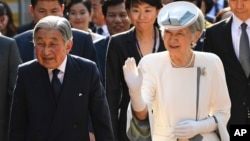Japan’s parliament passed a law Friday to allow Emperor Akihito to abdicate and be succeeded by his elder son, Crown Prince Naruhito, 57.
Akihito, 83, who has had heart surgery and treatment for prostate cancer, last summer indicated his desire to abdicate after nearly three decade on the Chrysanthemum Throne, reviving a longstanding debate in Japan over the issue of Imperial succession in the 2,000-year-old monarchy.
The abdication would be Japan’s first in 200 years. Akihito was 56 when he ascended the throne in January 1989 after the death of his father, Emperor Hirohito.
Media reports have said officials are considering the end of 2018, when Akihito turns 85, for the abdication.
In a vote televised live on NHK public television, the upper house of parliament passed the bill unanimously Friday, after the lower chamber gave its approval last week.
The abdication must take place within three years of the new law taking effect or it expires, and it only applies to Akihito.
The last Japanese emperor to abdicate was Kokaku in 1817.





